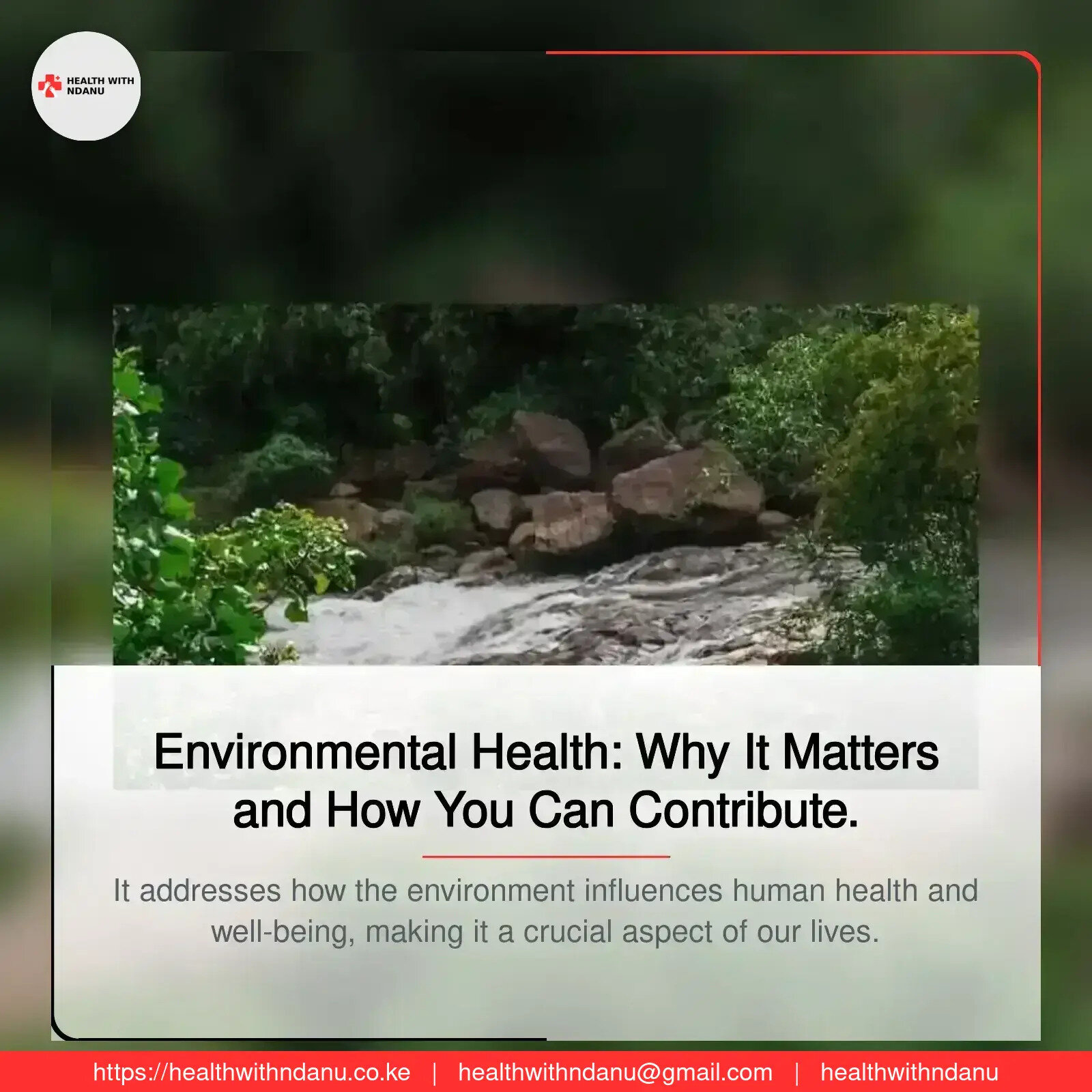Environmental Health: Why It Matters and How You Can Contribute.
- by Diana Ndanu
- 22 December, 2024
- 0 Comments
- 3 Mins



Introduction
Environmental health is the branch of public health that focuses on the interactions between people and their environment. It addresses how the environment influences human health and well-being, making it a crucial aspect of our lives. From the air we breathe to the water we drink, environmental factors significantly impact our health. As concerns over climate change and pollution grow, understanding and prioritizing environmental health has never been more important.
Key Components of Environmental Health
1. Air Quality
Clean air is essential for a healthy life, yet air pollution remains a global challenge. Harmful pollutants, such as carbon monoxide and particulate matter, contribute to respiratory and cardiovascular diseases. Reducing emissions from vehicles and industries is key to improving air quality.
2. Water Safety
Access to clean water is a basic human right, but millions globally lack this necessity. Contaminated water sources can cause diseases like cholera and dysentery. Protecting water supplies through better waste management and stricter regulations is vital.
3. Soil Contamination
Healthy soil supports agriculture and biodiversity. However, industrial waste and overuse of pesticides degrade soil quality, impacting food production and ecosystems. Promoting sustainable farming practices is essential.
4. Waste Management
Improper waste disposal leads to pollution and health risks. Recycling, composting, and reducing single-use plastics can minimize waste's impact on the environment and public health.
Environmental Health Challenges
1. Climate Change
The rising global temperatures affect ecosystems, weather patterns, and human health. Heatwaves, flooding, and other extreme weather events are direct consequences of climate change, emphasizing the need for urgent action.
2. Pollution
Pollution affects air, water, and soil, posing severe health risks. For instance, plastic waste in oceans harms marine life and enters the food chain, affecting human health.
3. Urbanization and Deforestation
As cities expand, natural habitats are destroyed, leading to loss of biodiversity and increased pollution. Sustainable urban planning and reforestation can mitigate these effects.
Benefits of Protecting Environmental Health
1. Healthier Communities
Reducing pollution and improving sanitation lower the prevalence of diseases, creating healthier societies.
2. Economic Advantages
Investments in clean energy and sustainable practices reduce healthcare costs and create green jobs, boosting economies.
3. Biodiversity Conservation
Preserving ecosystems ensures the survival of countless species, which play critical roles in maintaining ecological balance.
How You Can Make a Difference
1. Adopt Sustainable Habits
- Reduce waste by opting for reusable products.
- Conserve energy by using energy-efficient appliances and limiting electricity usage.
- Support public transportation or carpool to reduce carbon emissions.
2. Advocate for Green Policies
Join or support organizations that promote environmental protection. Petition for stricter pollution controls and cleaner energy sources.
3. Support Sustainable Businesses
Choose products and services from companies that prioritize sustainability and ethical practices.
Future of Environmental Health
1. Innovations in Sustainability
Advances in renewable energy, waste-to-energy technologies, and eco-friendly materials are paving the way for a greener future.
2. Global Cooperation
International agreements, like the Paris Climate Accord, highlight the importance of collaborative efforts in combating environmental issues.
Conclusion
Environmental health is not just a public health concern; it is a collective responsibility. By addressing air and water quality, waste management, and climate change, we can create a healthier, more sustainable world for future generations. Small individual actions, when multiplied globally, can make a significant difference. Let’s prioritize environmental health today for a better tomorrow.
Got Your Own Experience? Share with us
Kategoria Maarufu
Blogu Zinazotembelewa Zaidi
Daily Newsletter
Get all the top stories from Blogs to keep track.



